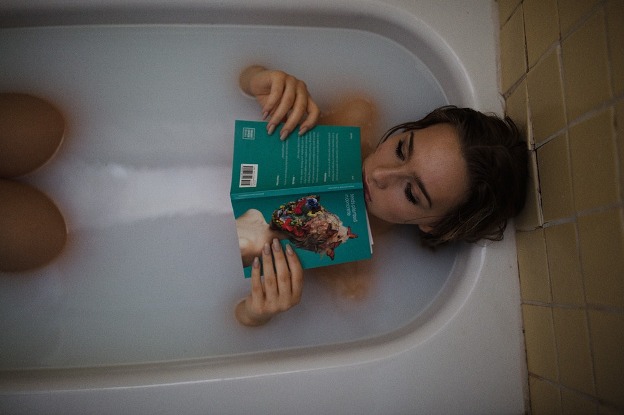“Self-care” and the industry it has spawned (let’s call it the “Industrial Enlightenment Complex”) is exclusive and affordable only to people with gobs of disposable income.
Representation of marginalized populations is scarce-to-non-existent in the self-care universe.
However, the people who need it most are the marginalized folks. They don’t have extra time to research fancy self-care techniques. They don’t have money lying around for lessons about unwinding in a healthy way.
We, the 99 percent, are the ones who need self-care the most.
But, in a culture in which we are bombarded by ads and the latest deal o’ the day, it is hard to know what can really help us and what is just a scam.
We hear offers like: buy this vitamin pack, and you’ll sleep better, have more energy, and better sex.
Really?
Oh, yeah—and I’ll have a better-looking butt if I wear those new yoga pants. (Bonus: I’ll reach Samadhi faster, because it is designed to allow my chakras to flow.)
In my humble opinion, most of this is bullsh*t.
However, taking care of our bodies and minds is critical.
Elephant Journal’s founder, Waylon Lewis, explains it best:
“Self-care is such a trendy little term at a time when the 1 percent is setting to tax the 99 percent and strip their health care in the process. But: taking care of yourself, yes. It’s never been more important.”
The body is the machine we use to walk around. If it’s not working well, we’re miserable. We are unkind to our family and to ourselves. We have difficulty being compassionate, because we’re tied up in discomfort and worry—and that’s no good.
If our minds are distracted, we’re easy to manipulate. (Corporations and oligarchies like a mindless, disempowered citizenry.) We stop thinking reasonably. We lash out easily. We look for immediate relief instead of deep healing that can affect real change.
We are genetically programmed to react to stress, via the fight-or-flight response. It’s part of how we’ve survived as a species up to now. But, at the same time, we have so many tools (many free or inexpensive) that can help us find our center and move through life with more ease.
Still, it can be difficult to find the balance without some guidance. I’ve been both a hardcore-vegan yogi and a BBQ-eating, TV-binging sloth. I was a dyed-in-the-wool, try-everything-I-can, new-agey spiritualist—and once, I chased armadillos around a field, scaring them for fun. (It’s awful. I’m embarrassed about it. Don’t ever do it.) My pockets have been full of money to spend, and I’ve also struggled to make rent.
What I’ve learned, in my 50 years or so on this planet, is that when I take time to take care of myself without going to extremes, I feel better. Even if my circumstances haven’t changed that much, I have changed the way I respond to them.
So, if you can’t (or won’t) afford the latest vitamin pack from Goop or a two-week meditation retreat in the Himalayas, there is still a heck of a lot you can do to take care of yourself.
Here are a few ideas you might wanna try:
1. Take time out. Take five or more minutes when you first wake up to center yourself and connect with the part of you that is more than your hairstyle or job. I know that I forget that part of me if I don’t make an effort to check in. In those five minutes, do something that reminds you of your long-term goals—the deep inside kind, not the goal to purchase the new flat-screen TV; you can think about that later—but to enjoy time with your family, to be a good friend, to make the world a better place.
Maybe you could read a poem that inspires you or sing your favorite song out loud. You could sit and pay attention to your breath, stretch, or dance like nobody’s watching. Keep it simple. You might find yourself distracted at first, but that’s normal and totally okay. Stick with it. Be selfish about those five minutes. See if you notice a change.
2. Go outside. If you’re feeling frustrated at work or at home, get your butt outdoors. Take 10, 20, or 40 minutes to be in nature. Really look at the bark on a tree, or watch how the leaves and branches stretch upward. If there are no trees, find a piece of sky. What color is it? Are there clouds? If there’s nothing going on in the sky (hard to imagine) look at the sidewalk. Are there bugs? What are they doing?
Explore until you find something that catches your senses. Describe these things to yourself as you see them. If you do this in public, it is probably best to do it silently, or you might attract the kind of attention you don’t want. It does take a little time, but engaging with nature has been proven to improve your mental and physical well-being. And, even better, it’s free!
3. Remember: you are what you eat. As often as you can eat foods that resemble something that grows in nature. The easier it is to recognize where the food came from, the better. Animal, vegetable, mineral. I’m a vegetarian, so I eat as many grains and veggies as I can. Sometimes we pop a box of mac-n-cheese on the stove top, and my daughter loves veggie corn dogs—I know, what’s in there? But, we do our best, with our super-full schedules and a tight budget, to eat food that we recognize as healthy.
What is healthy will look different for each of us, and there’s no judgment here. I am pretty sure you’ll feel different even with minimal awareness of the fuel you give your body.
4. Talk with a friend. Connection can really ground you when life feels like more than you can handle. If you can meet for a coffee or on a park bench, awesome. If that’s totally impossible, maybe a phone call? If you’ve got kids, multiple jobs, and there’s not a free minute in your day, exchange a text or two. I’m pretty sure you’ll feel better, and I bet your friend will too.
I do all these things to varying degrees depending on the day.
There are many people and companies that charge a reasonable fee for their good work. They can help you kick-start a new practice, provide community, and share advice on how to manage your mind or make healthy food choices. You may like to seek them out while taking good care of yourself in the free ways mentioned above.
Maybe practice some yoga via videos on YouTube if that sounds fun. Even better, invite friends over, and do it together. Go to the local YMCA, or walk through the neighborhood with a friend.
Just do something.
Not to be a downer, but it looks like most of our taxes will increase in the near future—and I’m sure, ’cause I’m in the healthcare pool, that our insurance costs are rising. Kids and teens are under more stress than I’ve seen in all my years, and our parents are aging.
We need—for ourselves and our loved ones—to be awesome stewards of the only thing that’s really ours: our own body-mind complex. And that’s the kind of healthy complex we all need.
~
Author: Jennie Benjamin
Image: Pixabay
Apprentice Editor: Cathy Boyce // Editor: Yoli Ramazzina
Copy editor: Catherine Monkman
Social editor: Nicole Cameron






Read 6 comments and reply